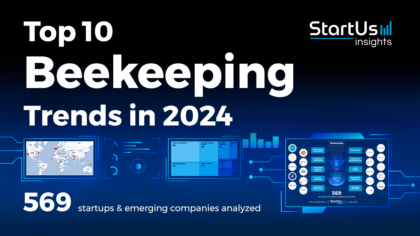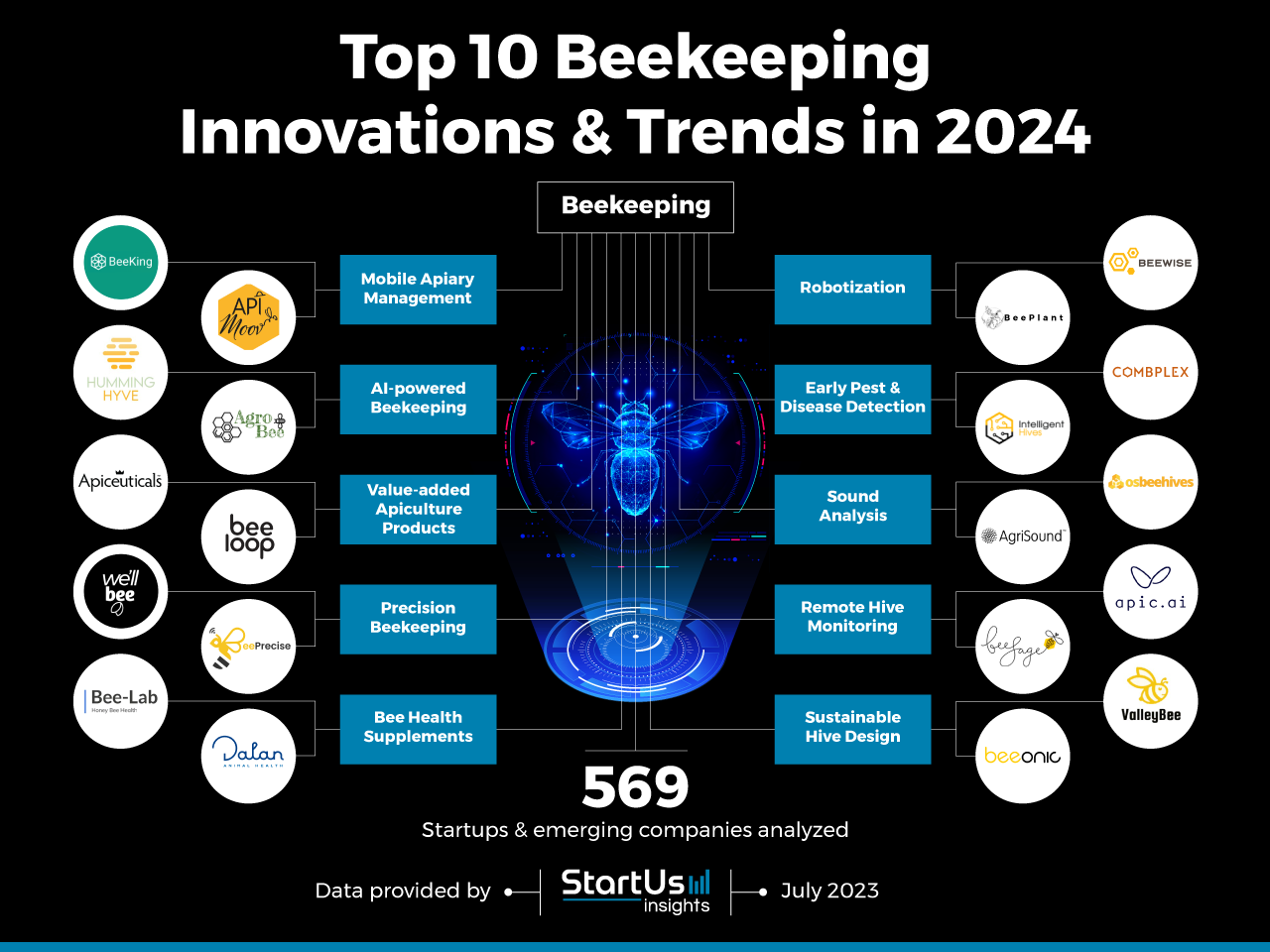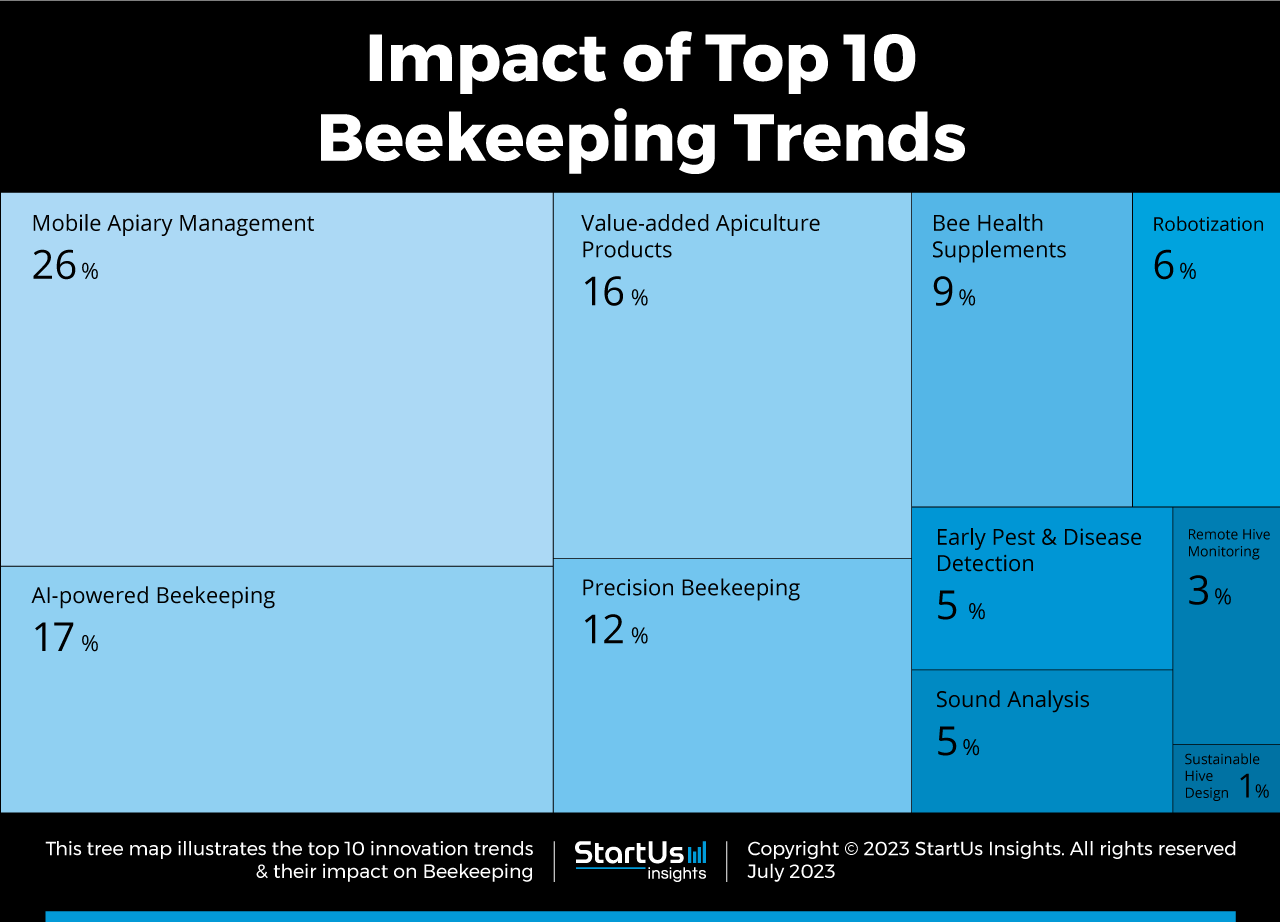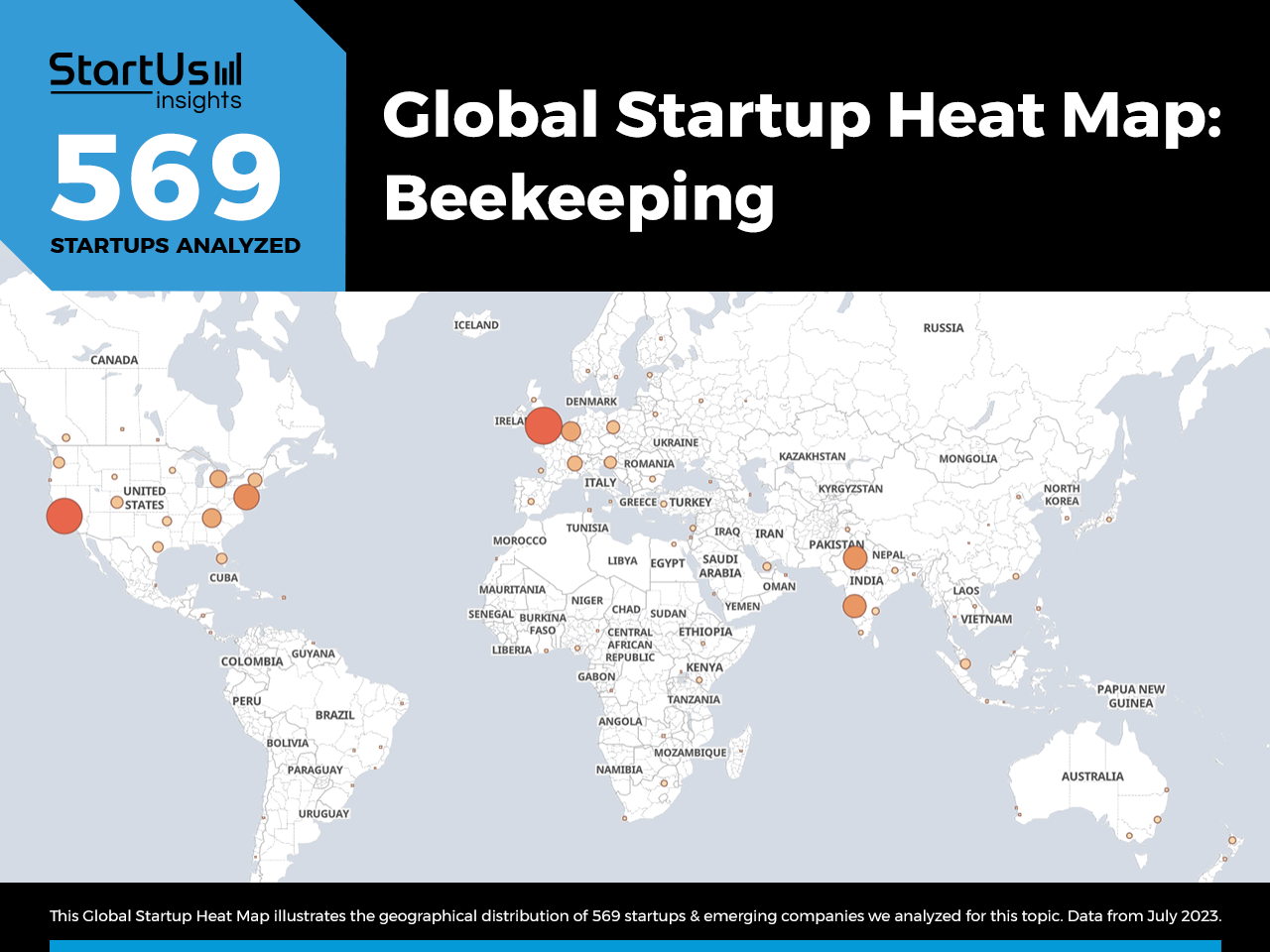The beekeeping industry is deploying modern technologies to advance apiculture and save the bees. These beekeeping innovations range from mobile apiary management to artificial intelligence (AI) and robotization. They enable end-to-end swarm monitoring, improve bee health, simplify hive assessments, and ensure an optimal colony environment. This industry report delves into the top 10 apiculture and beekeeping trends in 2024. Read further to explore how each trend improves bee health and production quality.
Innovation Map outlines the Top 10 Beekeeping Trends & 20 Promising Startups
For this in-depth research on the recent trends in beekeeping & startups, we analyzed a sample of 569 global startups & scaleups. This data-driven research provides innovation intelligence that helps you improve strategic decision-making by giving you an overview of emerging technologies in the beekeeping and apiculture industry. In the Beekeeping Innovation Map, you get a comprehensive overview of the innovation trends & startups that impact your company.
Top 10 Beekeeping Innovations & Trends in 2024
- Mobile Apiary Management
- AI-powered Beekeeping
- Value-added Apiculture Products
- Precision Beekeeping
- Bee Health Supplements
- Robotization
- Early Pest & Disease Detection
- Sound Analysis
- Remote Hive Monitoring
- Sustainable Hive Design
These insights are derived by working with our Big Data & Artificial Intelligence-powered StartUs Insights Discovery Platform, covering 3 790 000+ startups & scaleups globally. As the world’s largest resource for data on emerging companies, the SaaS platform enables you to identify relevant technologies and industry trends quickly & exhaustively.
Tree Map reveals the Impact of the Top 10 Beekeeping Industry Trends
Based on the Beekeeping Innovation Map, the Tree Map below illustrates the impact of the Top Beekeeping Trends in 2024. Mobile apiary management solutions streamline operations and improve hive management through smart technologies and automation. At the same time, beekeepers leverage AI, the Internet of Things (IoT), sound analysis, and remote hive monitoring. They improve overall farm efficiency while reducing labor dependency. Precision beekeeping techniques also utilize data to optimize hive conditions, improve resource management, and enhance pollination services.
Value-added apiculture products such as beeswax-based cosmetics and propolis health supplements are another set of beekeeping innovations. Novel bee health supplements provide essential nutrients, support colony health, and boost bee immune systems. Early pest and disease detection enables proactive intervention, reducing colony losses and improving bee health. Lastly, beekeepers are creating eco-friendly hive structures that prioritize bee welfare and minimize the environmental impact of their operations.
Global Startup Heat Map covers 569 Beekeeping Startups & Scaleups
The Global Startup Heat Map below highlights the global distribution of the 569 exemplary startups & scaleups that we analyzed for this research. Created through the StartUs Insights Discovery Platform, the Heat Map reveals high startup activity in the US and UK, followed by India. Below, you get to meet 20 out of these 569 promising startups & scaleups as well as the solutions they develop. These beekeeping startups are hand-picked based on criteria such as founding year, location, funding raised, & more. Depending on your specific needs, your top picks might look entirely different.
10 Emerging Trends in Beekeeping (2024)
1. Mobile Apiary Management
Mobile apiary management enables beekeepers to monitor multiple hives in real-time. It provides data on the go for parameters like temperature, humidity, hive weight, and even sound, depending on the apiary technologies used. This empowers the apiarist to take immediate corrective action to safeguard honeybee health if any abnormalities occur. Moreover, mobile systems provide remote access to hive data. This allows farmers to manage multiple apiaries simultaneously as well as save time and resources on physical inspections.
Digital bee farm management platforms enable easy and efficient record-keeping and provide insights into operations, aiding in long-term hive management. To aid this, emerging companies develop solutions supporting data-sharing functionalities among the beekeeping community. This facilitates collective learning, and problem-solving, and contributes to scientific research.
BeeTech Services makes a Digital Beekeeping Assistant
Latvian startup BeeTech Services develops BeeKing, an end-to-end apiary and management software solution. It features queen bees and colony life-cycle management, apiary, and hive record keeping, and facilitating inspections for managing hives. The software uses real-time tracking using near-field communication (NFC) tags and voice sensors to enable rapid response to changes in hive conditions and honey bee health.
Further, the software provides comprehensive data analysis to empower informed decision-making for increased productivity and hive health. BeeKing thus simplifies the management of multiple apiaries and colonies. It also provides insights into bee origin counts, varroa treatments, and the amount of honey and pollen collected.
Apimoov facilitates Mobile Colony Monitoring
French startup ApiMoov provides a beekeeping app and web portal for apiculturists to track their hives and colonies. It is a field recording tool that allows farmers to record observations and actions on their hives by interface. This enables tracking the evolution of the brood and food, and action planning for colony, varroa, and queen bee management.
Moreover, the solution aids the creation of artificial swarms, yield management of honey and royal jelly, and offline hive monitoring using voice recognition. The web portal also provides an integrated summary of hives, apiary visit analysis, and alerts for organized digital beekeeping.
2. AI-powered Beekeeping
Artificial intelligence enables the automated processing of vast amounts of beekeeping data and enables predictive analysis. Beekeepers leverage AI algorithms to anticipate metrics such as honey yields, optimal times for hive splitting, and early recognition of infestations. Advanced AI algorithms analyze sound and visual data from hives to assess bee health and behavior.
By providing real-time accurate insights, AI empowers beekeepers to efficiently manage their resources and increase revenues. This way, apiculturists reduce the time and effort required for routine checks and operations. Moreover, advances in machine learning (ML) allow researchers to better understand bee behavior and colony health based on environmental changes and beekeeping practices.
Humming Hyve facilitates Beehive Condition Monitoring
Humming Hyve is a Pakistani startup that offers a piece of beekeeping equipment, Bumble Bee V1.0. It is an IoT device to monitor the condition of beehives and the honey produced. The startup’s device is equipped with a temperature and humidity sensor, a load cell, and a GPS module. It collects data on the hive’s environment and sends it to the cloud for analysis.
The startup’s AI and ML algorithms then analyze the hive data to identify potential problems such as pests, diseases, or low honey production. Moreover, the startup’s companion mobile app delivers alerts when the hive environment is not optimal. This way, the startup’s solution aids bee behavior monitoring and control for better hive management and honey production.
Agrobee enables AI-assisted Pollination
Brazilian startup Agrobee builds a smartphone application that ensures sustainable pollination and biological control in crops by connecting farmers and apiarists. It leverages AI to forecast the best pollination time for different farming cultures and enables farmers to send pollination requests to beekeepers.
Similarly, beekeepers use Agrobee’s app to track and analyze pollinator behavior in the field and manage pollination requests. Agrobee’s technology enables farmers to reduce reliance on chemicals and enables beekeepers in remote beehive management, increasing revenue.
3. Value-added Apiculture Products
Value-added apiculture products diversify income sources for beekeepers, making their revenues less dependent on honey production alone. This provides financial stability, particularly in times of reduced honey production due to disease, pests, or adverse weather. Beekeepers develop many value-added products that utilize byproducts of beekeeping that are otherwise wasted. For example, candles, balms, or cosmetics made from beeswax and propolis in health products.
These products also offer alternatives to synthetic products in various industries like cosmetics, health supplements, and food. Startups increasingly use propolis, royal jelly, honey, and bee pollen in dietary supplements, pharmaceuticals, and gourmet foods. This way, novel companies allow beekeepers to expand their market as well as cater to consumer demands for natural products.
Apiceuticals manufactures Clean Skincare Products
Greek startup Apiceuticals develops a proprietary PROPOWAX technology to make clean skincare products. The technology utilizes honeycomb as a bioactive ingredient for antioxidants in its cosmetic products. This way, the startup adds value to bee-sourced products by ethically sourcing ingredients for its cosmetics lineup.
Bee Loop makes Beeswax-based Packaging
Lithuanian startup Bee Loop provides zero-waste honey packaging made from pure beeswax. The startup’s beeswax-based packaging pot is reusable and returnable to local beekeepers or Bee Loop to be recycled and reused. It keeps the stored honey in its natural state and mitigates the waste otherwise generated due to packaging.
4. Precision Beekeeping
Integrating IoT sensors, cameras, and remote monitoring allows beekeepers to collect real-time data on hive conditions and leverage precision beekeeping. This allows beekeepers to closely monitor hive health, temperature, humidity, weight, and other crucial parameters. Companies also develop digital beekeeping platforms that analyze trends, patterns, and correlations in the data to make informed decisions.
Precision beekeeping platforms empower hive management, resource allocation, and timely interventions in case of urgency. Beekeepers monitor honey stores, pollen availability, and colony strength to make informed decisions on supplemental feeding, hive splitting, or honey extraction. By monitoring hive conditions and behavior, beekeepers take proactive measures to manage hive population, reduce swarming, and maintain hive productivity.
We’ll Bee provides AI-powered Hive Data Processing
Italian startup We’ll Bee develops a device and web platform, Beeasy, to support the beekeeping industry. Beeasy leverages a robotic eye that autonomously and automatically monitors the movements of individual bees entering or leaving a hive. Its AI utilizes this data with parameters like internal temperature and weight to provide real-time insights into the hive environment and bee activity.
Beeasy’s web interface further provides bee behavior and pollen analysis. It also estimates death rate, imminent swarming or swarming fever, and the presence of parasites. This provides beekeepers valuable insights to promote healthier hives and improve production without interfering with the life of bees.
Ecosight Technologies advances Data-Driven Beekeeping
Indian startup Ecosight Technologies builds Beeprecise, an AI-integrated platform with a multi-sensor smart hive device for precision beekeeping. The startup’s smart device collects real-time data in and around beehives and relays it to the cloud via a gateway hub. Its AI analyzes this data to provide insights into hive conditions and detect potential threats through the BeePrecise application.
Thus, Beeprecise optimizes the beekeeping process and provides alerts on swarming, hive splitting, pollination efficiency, diseases, and weak colonies among others. This real-time information aids in proactive hive management and prediction of honey production and other hive activities.
5. Bee Health Supplements
Apiculturists use health supplements to inherently enhance the immune system and overall well-being of bees. Such formulations deliver essential nutrients, vitamins, and minerals that may be lacking in a bee’s natural environment. Innovative supplements support stronger and healthier colonies, improving their resistance to diseases and pests. Moreover, they help bees recover from stressors like pesticide exposure, environmental changes, or habitat loss by providing the necessary nutrients.
Health supplements often include ingredients that reduce stress and induce calmness within the hive. This contributes to long-term survival and bee population sustainability. Apiarists use supplements, particularly during periods of high-stress activities like transportation, hive splitting, or environmental disturbances as well as for brood development. This contributes to stronger and more productive worker bees, leading to overall hive strength and productivity.
Bee-Lab offers Vitamins & Supplements for Bees
Greek startup Bee-Lab makes vitamins and supplements to improve bee health. The startup’s Booster range of products is a natural bee supplement containing essential micronutrients. They include bioflavonoids and vitamins that improve bees’ immune function.
Similarly, it offers Aciflex oxalic acid stips to prevent varroa mite growth in hives and maintain overall colony health and productivity. The startup’s products are sourced from natural ingredients and maintain bee colony health without disrupting their normal activities.
Dalan Animal Health develops a Bee Vaccine Program
US-based startup Dalan Animal Health builds a bee vaccine program to vaccinate queen bees against American Foulbrood (AFB). The startup’s technology utilizes an inactive vaccine mechanism that exposes dead bacteria to queen bees. This results in improved infection resistance in larvae.
The vaccine is delivered by mixing it with queen candy and does not impact the queen’s fitness. The startup provides custom vaccination programs for queen cages. This enables beekeepers to protect their bee colonies, especially newly hatched honeybee larvae against the Paenibacillus larvae.

6. Robotization
Robotization is another innovation in beekeeping that is transforming the industry by automating various labor-intensive tasks and providing precision management for beehives. Robots and automated systems handle hive inspections for colony health monitoring, honey production assessments, and pest or disease detection. Robotic arms for manipulating hive frames also reduce the risk of damaging the hive and minimize the disturbance to bees.
Automated honey extraction processes also save time and labor, improving the efficiency of honey harvesting while maintaining product quality. Robots are increasingly used in conjunction with machine learning and computer vision to identify patterns and anomalies in bee behavior. This allows beekeepers to respond swiftly to potential issues such as diseases, parasites, or environmental stressors. Consequently, robotization optimizes honey production and maintains the health and vitality of bee colonies.
BeeWise advances Autonomous Beehive Management
US-based startup BeeWise designs an autonomous beehive management system with an integrated smartphone app. Beehome is the startup’s robotic beehive that combines AI and precision robotics to monitor and treat each individual bee in the hive. It also features climate and humidity control, pest control, autonomous swarm prevention, and automated crop harvesting.
This enables real-time reaction to threats, minimizing hive loss, and improves bee productivity by optimizing hive conditions. Moreover, the startup’s solution is solar-powered and is placed in the fields to provide sustainable and automated hive monitoring, improving pollination. This way, it reduces the manpower and resources required to manage beehives and honeybee health.
Beeplant Makine offers Robot Beekeeper
Turkish startup Beeplant Makine builds BeePlant, a mobile hive and robotic beekeeper. It leverages image processing to track the starter and breeding colony in hatching as well as bee larvae and their ages. The solution then identifies the number and location of honeycomb nests best suited for royal jelly production.
BeePlant utilizes this data to transfer the identified bee larvae into beeswax thimbles in its mobile hive for harvesting good-quality royal jelly. Beeplant Makine thus reduces labor requirements and significantly improves harvest outcomes.
7. Early Pest & Disease Detection
Detecting pests and diseases early on enables beekeepers to intervene promptly and minimize their spread. Digital solutions to identify pest and infection infestation issues equip beekeepers with treatment strategies. Early detection and timely intervention also reduce their impact on hive health and colony productivity, saving substantial colony and revenue loss.
Innovative technologies, such as AI-powered image recognition systems or sensor-based monitoring, facilitate continuous monitoring of hive conditions. These technologies detect abnormal behavior, irregular patterns, and signs of disease, allowing for proactive measures to maintain colony health. Companies are also developing alternative methods, like lasers, to detect and mitigate infestations like varroa mites or foul broods. These measures minimize the use of chemical treatments.
Combplex provides Varroa Mite Control Tool
US-based startup Combplex develops a laser-based varroa mite infection prevention tool. The startup’s product is a portable laser device that combats Varroa mites in bee colonies and alerts the beekeepers before taking preventive actions.
The laser device provides a chemical-free, non-invasive alternative to otherwise chemical-based solutions. It, thus, ensures higher survival rates for bees and improves overall hive health. Beekeepers and farmers use this tool to monitor hive health remotely and manage pest infections cost-effectively.
Intelligent Hives accelerates Hive Disease Detection
Intelligent Hives is a Polish startup that develops an intelligent hive application that enables remote hive access and disease detection. The startup’s Beehive Monitoring System combines IoT sensors, GPS locators, and an integrated platform to monitor hive conditions in real-time.
The technology alerts beekeepers of any irregularities and enables the identification of diseases. It improves bee health, increases honey yield, and reduces labor costs by efficiently tracking various hive parameters and prompting corrective actions.
8. Sound Analysis
Beekeepers utilize sound analysis for the early detection of abnormalities or changes in bee behavior. By analyzing the sounds produced by the hive, beekeepers identify potential issues such as queenlessness and swarming preparations. Further, sound analysis algorithms identify beehive patterns for early detection of issues such as Varroa mite infestations, AFB, or other diseases. Early detection enables prompt intervention and effective management.
Sound-based monitoring serves as a non-invasive method that further enables beekeepers to assess hive health and behavior without disturbing the bees. This reduces stress on the bees and minimizes disruptions to their natural processes. Additionally, it saves time and resources on physical hive inspections.
OSBeehives aids Colony Audio Analysis
US-based startup OSBeehives builds a hive audio analysis solution for bee inspection and hive monitoring. BuzzBox Mini is the startup’s acoustic sensor that listens to bee colony acoustics. Its AI algorithms then analyze the data to interpret hive health.
The device sends alerts in the connected mobile app regarding potential issues, allowing timely interventions. It also supports data-driven decision-making with its comprehensive health metrics covering hive temperature, humidity, and inspection records. Thus, OSBeehives enables beekeepers to listen to and manage hive health remotely and wirelessly.
AgriSound facilitates Beehive Acoustics Monitoring
UK-based startup AgriSound develops an interference-less in-hive sensor for sound-based hive monitoring. The startup utilizes IoT-connected sensors to collect vital bioacoustic data on changes within the hive. They allow beekeepers to monitor bee colony health and productivity by enabling preventive actions against threats.
The solution also simplifies data analysis of the recorded bioacoustics using any connected device. Additionally, Agrisound provides insights into honey yield prediction through IoT-enabled hive scales. The startup advances bee husbandry using a data-driven approach and ensures the sustainability and productivity of hives.
9. Remote Hive Monitoring
Remote hive monitoring enables beekeepers to access real-time data on hive conditions like temperature, humidity, hive weight, and activity levels. This allows for continuous monitoring and immediate awareness of any changes or abnormalities. Innovative remote monitoring tools provide valuable insights into resource management, such as honey stores and pollen availability.
Accordingly, beekeepers make informed decisions regarding supplemental feeding, swarm prevention, or honey extraction. This optimizes resource allocation and hive productivity. Moreover, remote monitoring of bee hives reduces the frequency of physical inspections, saving labor and time for beekeepers. This is particularly useful in large-scale operations and multiple apiaries while minimizing stress on bees.
apic.ai digitizes Bee Behaviour Monitoring
German startup apic.ai delivers automated pollinator behavior monitoring through its edge computing and AI-based solution for beekeepers. It leverages a minimally invasive camera system to detect the movements of bees and bumblebees entering and exiting the hive. The solution’s pre-trained AI analyzes the gathered video footage and delivers insights customized to the user’s question.
The visual camera feed is solar-powered and enables continuous monitoring even in the case of power cuts. It monitors pollinator activity in any given time interval, foraging behavior, and pollen diversity by assessing pollen baskets, size, and mortality rates. This technology provides beekeepers with data-driven insights for their product and activity design by automating pollinator behavioral assessments.
BeeSage builds Smart Beehive Scales
Dutch startup BeeSage provides a digital beehive scale and connected application. The startup’s smart beehive scale is placed under average-sized colonies to measure the production capacity. Its app uses smart scale data to estimate the production capacity of the whole apiary with hourly telemetry data updates.
The device records beehive weight, 24-hour weight changes, and ambient temperature as well as maps location and provides web alerts. This enables apiarists to manage multiple colonies simultaneously, evaluate nectar flow, plan honey harvesting, and prevent vandalism.
10. Sustainable Hive Design
Although beekeeping is a sustainable industry in itself, hive design further reduces the environmental footprint of beekeeping. Startups focus on developing renewable energy-powered hives that provide optimal living conditions for bees. It considers factors such as ventilation, insulation, and space utilization to create a comfortable and healthy environment that promotes the well-being of the colony. Further, sustainable hive design integrates features that support natural pest and disease management.
Startups incorporate removable bottom boards for mite control, entrance reducers, and screened floors for ventilation, reducing the need for chemical treatments. Novel hive designs also include swarming management features such as providing adequate space for colony expansion and implementing queen excluders, or swarm traps. Further, startups are prioritizing the use of eco-friendly and renewable materials from sustainably sourced wood or recycled components.
ValleyBee makes Recycled Plastic Hives
Nigerian startup ValleyBee produces a hive using recycled plastic material. The hive is designed to mimic natural bee habitats and therefore does not include frames, foundations, or excluders.
Moreover, the hive features integrated sensors, a humidifier, and a heat source to automatically adjust the internal temperature as per the external environment. The startup offers colony installation and management services as well as provides a mobile platform for remote hive monitoring and adjustments.
beeonic provides Sustainable Hive Designs
German startup beeonic manufactures an IoT-enabled and stackable beehive using natural materials. It is made from a heat-insulating and moisture-regulating core using sheep’s wool, which naturally regulates the hive environment. This also reduces the chances of disease infestation and mold formation in the beehive.
The hive features sensors and a cloud platform to monitor the hive environment for temperature, humidity, and weight. This provides beekeepers with a sustainable hive design that regulates insulation and moisture to optimize hive handling.
Discover all Beekeeping Trends, Technologies & Startups
As climate change is impacting bee populations, startups are developing sustainable solutions for beekeeping and bee-sourced products. At the same time, 3D printing is enabling durable and lightweight hive designs. Drones and unmanned aerial vehicles (UAVs) further find application in pollinator behavior monitoring. Similarly, blockchain is empowering honey producers and extractors to establish their product authenticity and improve revenue generation.
The Apiculture Trends & Startups outlined in this report only scratch the surface of trends that we identified during our data-driven innovation & startup scouting process. Identifying new opportunities & emerging technologies to implement into your business goes a long way in gaining a competitive advantage.











